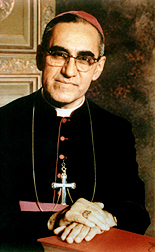Romero, Oscar
Óscar Romero was a Catholic Archbishop of San Salvador who spoke out against poverty, social injustice, assassinations and torture in El Salvador. In 1980, Romero was assassinated while offering Mass in the chapel of the Hospital of Divine Providence.
Pope Francis stated during Romero’s beatification that “His ministry was distinguished by a particular attention to the most poor and marginalized.” Hailed as a hero by supporters of liberation theology, Romero faithfully adhered to Catholic teachings on liberation, desiring a social revolution based on supernatural interior reform.
In 2010, the United Nations General Assembly proclaimed 24 March as the “International Day for the Right to the Truth Concerning Gross Human Rights Violations and for the Dignity of Victims” in recognition of the role of Archbishop Romero in defense of human rights. Romero actively denounced violations of the human rights of the most vulnerable people and defended the principles of protecting lives, promoting human dignity and opposition to all forms of violence.
In 1997, Pope John Paul II bestowed upon Romero the title of Servant of God, and a cause for beatification and canonization was opened for him. The cause stalled, but was reopened by Pope Benedict XVI in 2012. He was declared a martyr by Pope Francis on 3 February 2015, paving the way for his beatification, which took place on 23 May 2015.
Even outside of Catholicism, Romero is honored by other Christian denominations. Archbishop Romero is also one of the ten 20th-century martyrs depicted in statues above the Great West Door of Westminster Abbey in London. In 2008, Europe-based magazine A Different View included Romero among its 15 Champions of World Democracy.

